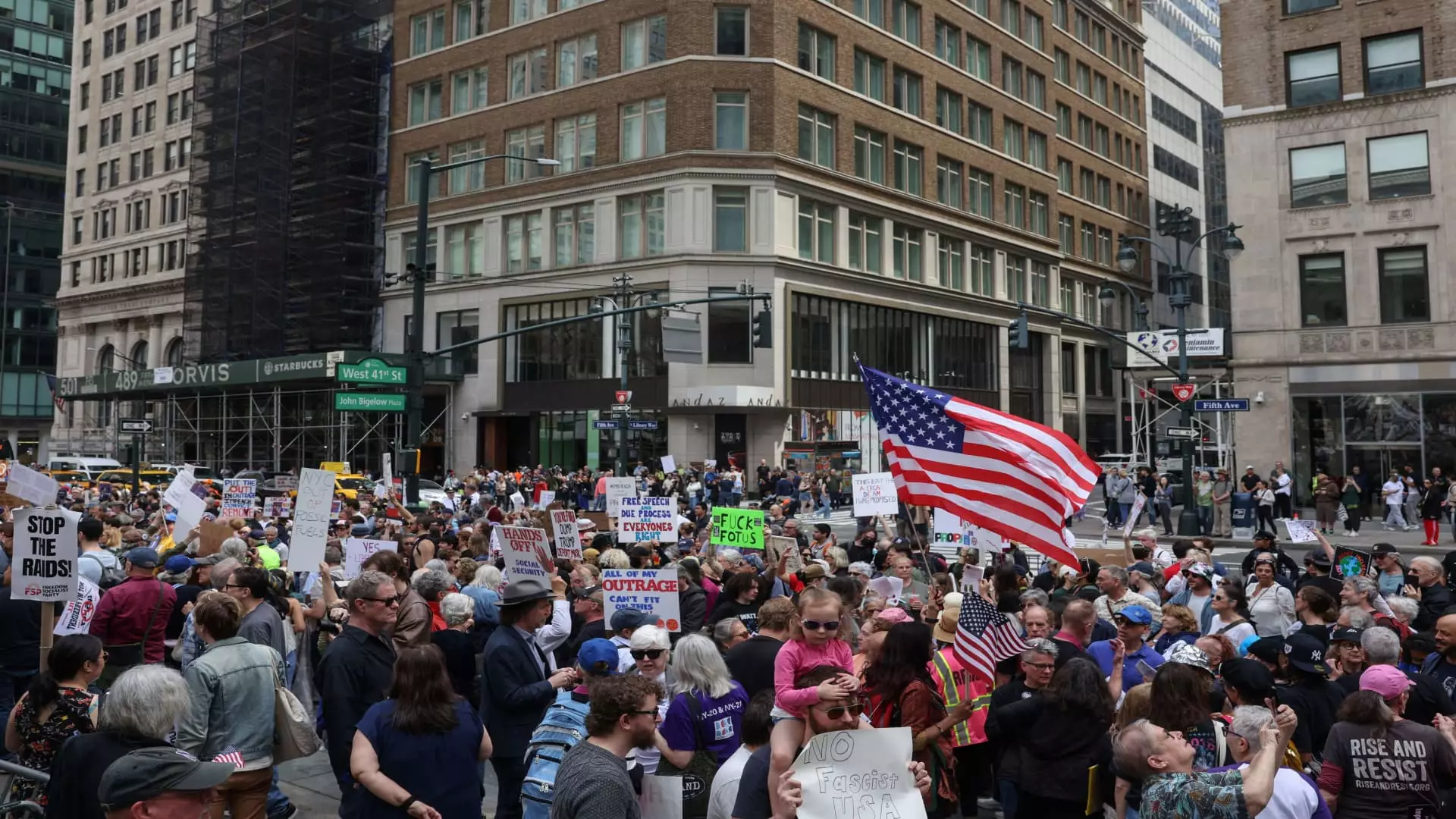The recent wave of protests across the United States highlights a galvanizing moment for those disenchanted with the direction taken by the current administration. Saturday saw communities—from massive urban centers like New York City to the quieter streets of Concord, Massachusetts—mobilize against what many see as an assault on the democratic principles that underpin our nation. These gatherings were not mere displays of dissent; they were urgent responses to a perceived existential threat. What brings citizens together from different walks of life is a pervasive feeling: one of loss—loss of liberties, rights, and democratic norms that have traditionally defined the American experience.
Outside of Boston, in vibrant Concord, the remembrances of the Revolutionary War echoed loudly. Citizens like Thomas Bassford reflected on history’s lessons, suggesting that the very foundation of America was laid upon the willingness to confront tyranny. At 80, Bassford embodies the generational divide, alerting younger individuals of the need for vigilance. With the proud declaration that sometimes, fighting for freedom is not just honorable but necessary, he reinforces a timeless truth: that democracy is a fragile concept which demands active protection.
The Crossroads of Ideals and Activism
As people protesting outside Tesla locations express their frustration at a billionaire advisor’s sway over the government, a larger narrative emerges. The reality is that the demarcation between corporate interests and governance appears increasingly blurred under the current administration. Activists are drawing parallels between economic power and political influence, envisioning a society where decisions are made by a privileged elite rather than by representatives of the populace. This is a point of contention that has significant ideological implications, as it raises critical questions about who truly governs in a democracy and for whom they serve.
Moreover, the spontaneous organization of community service events reveals a deeper undercurrent. It is not just a battle against perceived government overreach, but an affirmation of communal solidarity—against a backdrop of despair, citizens are saying, “We will not only protest, but we will uplift.” These actions underscore a strong message: while dissent is critical, proactive compassion fortifies the very democracy these individuals seek to protect.
Facing the Specter of Authoritarianism
The mounting fears regarding an apparent “police state” resonate deeply among Protesters. George Bryant’s impassioned words, “Trump fascist regime must go now!” reflect a broader anxiety that echoes through conversations across the political spectrum. The blurring lines between lawful governance and potential authoritarianism raises alarm bells for those who have studied history. In modern democracies, the concentration of power in one branch poses inherent risks.
Each rallying cry engages the ideological bones of America—not as a method of resistance against new policies, but as a dire call for upholding the checks and balances that are the backbone of our democracy. Public officials must remember that their actions are subject to scrutiny, and citizens are indeed keen observers of power dynamics. The unease articulated by many, including retired federal employee Bob Fasick, finds root in both civil rights violations and the erosion of essential social safety nets. The dismantling of programs like Social Security sends ripple effects throughout society and undermines the social compact that citizens expect from their government.
Rallying for Rights and Recognition
In the heart of Manhattan, demonstrators chanting “No fear, no hate, no ICE in our state” embody a collective resistance against what they perceive as broader xenophobic and oppressive tactics. The immigration issue has become a flashpoint for many as it embodies the closing of America’s doors to the vulnerable. As Melinda Charles poignantly articulated, the unchecked expansion of executive power threatens the very foundation of the tripartite system that ensures liberty.
The events are indicative of a pivotal moment in American discourse; it sends a clear signal that the populace will not stand idly by while fundamental rights are put to the test. Citizens are standing at a crossroads, faced with making their voices heard in an age where silence can be misconstrued as complicity. By mobilizing through both protest and service, they assertively reclaim their agency and demand accountability, exemplifying a committed resistance to forces that seek to undermine democratic ideals.
The tension in contemporary America is palpable, as citizens choose to not only rise against perceived threats but also engage in actions that amplify their values. The spirit of revolution once embodied by the likes of our forebearers seems to resurge quietly within these modern protests, and in their echo lies a resounding truth: liberty, once lost, is a hard-fought treasure that must be defended relentlessly.

